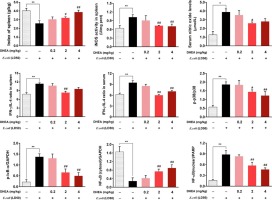Our official English website, www.x-mol.net, welcomes your
feedback! (Note: you will need to create a separate account there.)
Dehydroepiandrosterone resisted E. Coli O157:H7-induced inflammation via blocking the activation of p38 MAPK and NF-κB pathways in mice
Cytokine ( IF 3.7 ) Pub Date : 2020-03-01 , DOI: 10.1016/j.cyto.2019.154955 Jinlong Zhao 1 , Ji Cao 1 , Lei Yu 1 , Haitian Ma 1
Cytokine ( IF 3.7 ) Pub Date : 2020-03-01 , DOI: 10.1016/j.cyto.2019.154955 Jinlong Zhao 1 , Ji Cao 1 , Lei Yu 1 , Haitian Ma 1
Affiliation

|
Dehydroepiandrosterone (DHEA), a critical metabolite in cholesterol metabolism, can regulate the inflammatory responses in humans or animals. However, the precise mechanisms of these beneficial actions remains poorly understood. Present study aims to clarify the anti-inflammatory function of DHEA and its possible mechanisms in the E. coli O157:H7-stimulated mice. The results indicated that DHEA reduced the mortality of mice and bacterial concentration in the peritoneal fluid in the E. coli-stimulated mice. DHEA increased the spleen index, the activity of lactate dehydrogenase and acid phosphatase; while it decreased the nitric oxide (NO) content and inducible nitric oxide synthase (iNOS) activity in mice. The mRNA levels of tumor necrosis factor-α (TNF-α), interleukin-1β (IL-1β), interleukin-6 (IL-6) and interferon gamma (IFN-γ) were decreased, whereas the interleukin-4 (IL-4) and interleukin-10 (IL-10) mRNA levels were increased in the E. coli-stimulated mice treated with DHEA. Moreover, DHEA treatment reversed the increasing of IFN-γ/IL-4 ratio in mice caused by E. coli infection. Importantly, DHEA blocked the nuclear translocation of p65 through down-regulation the IκB-α protein phosphorylation level in the mice stimulated with E. coli O157:H7. No statically changes were showed on the phospho (p)-ERK1/2 and p-JNK1/2 protein level, while DHEA significantly suppressed the p-p38 protein level in mice. The above results indicated that DHEA alleviated inflammatory responses by suppressing NO secretion and promoting Th2-associated anti-inflammatory cytokines production in mice; and this action might relate to the blocking of p38 MAPK and NF-κB signaling pathways activation. All the above results provide substantial information for understanding the anti-inflammatory function of DHEA and further support it as a potential immunomodulatory in prevention inflammatory and bacterial infection diseases.
中文翻译:

脱氢表雄酮通过阻断小鼠 p38 MAPK 和 NF-κB 通路的激活来抵抗大肠杆菌 O157:H7 诱导的炎症
脱氢表雄酮 (DHEA) 是胆固醇代谢的关键代谢物,可以调节人类或动物的炎症反应。然而,这些有益作用的确切机制仍然知之甚少。本研究旨在阐明 DHEA 的抗炎功能及其在大肠杆菌 O157:H7 刺激小鼠中的可能机制。结果表明,DHEA 降低了小鼠的死亡率和大肠杆菌刺激小鼠腹腔液中的细菌浓度。DHEA增加脾指数、乳酸脱氢酶和酸性磷酸酶的活性;同时降低小鼠的一氧化氮 (NO) 含量和诱导型一氧化氮合酶 (iNOS) 活性。肿瘤坏死因子-α(TNF-α)、白介素-1β(IL-1β)、白介素-6(IL-6)和干扰素γ(IFN-γ)的mRNA水平降低,而在用 DHEA 处理的大肠杆菌刺激小鼠中,白细胞介素 4 (IL-4) 和白细胞介素 10 (IL-10) mRNA 水平增加。此外,DHEA 治疗逆转了由大肠杆菌感染引起的小鼠 IFN-γ/IL-4 比率的增加。重要的是,DHEA 通过下调用大肠杆菌 O157:H7 刺激的小鼠中的 IκB-α 蛋白磷酸化水平,阻断了 p65 的核转位。在磷酸 (p)-ERK1/2 和 p-JNK1/2 蛋白水平上没有显示出静态变化,而 DHEA 显着抑制了小鼠的 p-p38 蛋白水平。以上结果表明DHEA通过抑制NO分泌和促进Th2相关抗炎细胞因子的产生来减轻小鼠的炎症反应;这种作用可能与 p38 MAPK 和 NF-κB 信号通路激活的阻断有关。
更新日期:2020-03-01
中文翻译:

脱氢表雄酮通过阻断小鼠 p38 MAPK 和 NF-κB 通路的激活来抵抗大肠杆菌 O157:H7 诱导的炎症
脱氢表雄酮 (DHEA) 是胆固醇代谢的关键代谢物,可以调节人类或动物的炎症反应。然而,这些有益作用的确切机制仍然知之甚少。本研究旨在阐明 DHEA 的抗炎功能及其在大肠杆菌 O157:H7 刺激小鼠中的可能机制。结果表明,DHEA 降低了小鼠的死亡率和大肠杆菌刺激小鼠腹腔液中的细菌浓度。DHEA增加脾指数、乳酸脱氢酶和酸性磷酸酶的活性;同时降低小鼠的一氧化氮 (NO) 含量和诱导型一氧化氮合酶 (iNOS) 活性。肿瘤坏死因子-α(TNF-α)、白介素-1β(IL-1β)、白介素-6(IL-6)和干扰素γ(IFN-γ)的mRNA水平降低,而在用 DHEA 处理的大肠杆菌刺激小鼠中,白细胞介素 4 (IL-4) 和白细胞介素 10 (IL-10) mRNA 水平增加。此外,DHEA 治疗逆转了由大肠杆菌感染引起的小鼠 IFN-γ/IL-4 比率的增加。重要的是,DHEA 通过下调用大肠杆菌 O157:H7 刺激的小鼠中的 IκB-α 蛋白磷酸化水平,阻断了 p65 的核转位。在磷酸 (p)-ERK1/2 和 p-JNK1/2 蛋白水平上没有显示出静态变化,而 DHEA 显着抑制了小鼠的 p-p38 蛋白水平。以上结果表明DHEA通过抑制NO分泌和促进Th2相关抗炎细胞因子的产生来减轻小鼠的炎症反应;这种作用可能与 p38 MAPK 和 NF-κB 信号通路激活的阻断有关。











































 京公网安备 11010802027423号
京公网安备 11010802027423号